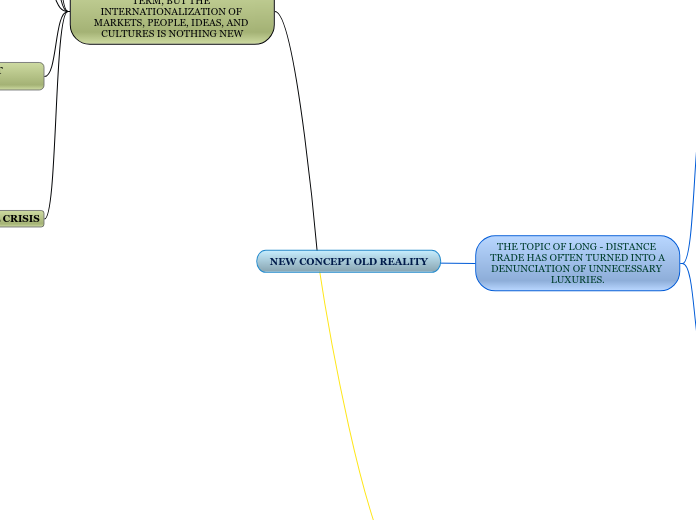NEW CONCEPT OLD REALITY
GLOBALIZATION IS A RECENT TERM, BUT THE INTERNATIONALIZATION OF MARKETS, PEOPLE, IDEAS, AND CULTURES IS NOTHING NEW
PAST OF GLOBALIZATION
Discovery
Archaeological
Global domain
Economic Renaissance back drop
Technobalization
The global interconnection of the 19th century
Transportation coordination
THE MIGRATION
In the globalization of the 19th century
The political dynamics of emigration
Countries have an opossite dynamic
SAFETY VALVES
Diver flows and cause floods elsewhere: this makes migration very unpopular.
Backlash against globalization hits the previous safety valve of migration.
REVOLTS AGAINST GLOBALIZATION
The movement of money, goods, people, ideas, technologies and cultures across borders
The term globalization, in its modern meaning, was coined in the 1970s to describe the internationalization of markets, especially financial ones.
THE GLOBAL FINANCIAL CRISIS
Teach to:
Relying on analysis of economic “trends” derived simply by extrapolating a short period.
The impact of the unexpected crisis that produced a new interest in observing patterns derived from much longer periods of time.
Larger and longer patterns can highlight vulnerabilities that help us discover how we should adjust the institutional framework to make globalization more stable, less dangerous and fairer.
STANDARDIZED SECURITY, INTERNAL POLITICAL DEMANDS AND CONSTITUTIONAL CHANGES IN THE EUROPEAN UNION
The German discussion of a hundred years ago in the wake of 1907. Many European economists, as well as outsiders, see the virtue of the early American experience, But a standardized security requires internal political and constitutional changes in the European Union that can be difficult to contemplate.
ZERO SUME GAME
For some other countries, it seems that the main lesson of the 2008 crisis is that the world is inherently a place of conflict and that the great powers are playing a zero-sum game in a fight for hegemony. It is not surprising that the objectives From this intense financial diplomacy look around for alternatives to the dollar and the international finance system. As an immediate response to the financial crisis.
A VISION OF HOPE
que la prosperidad no tiene límites fijos. No es una sustancia finita que se disminuya por división. Por el contrario, el más disfrutan otras naciones, más cada nación tendrá para sí mismo…. El segundo axioma es un corolario del primero. La prosperidad, como la paz, es indivisible. No podemos permitirnos
La visión de 1944-1945 se basaba en los vínculos entre áreas políticas y económicas. Pero la subsecuente separación de las arenas económicas y políticas hicieron problemas tanto en más difícil, o imposible, de resolver. Para intentar hacerlo se requiere un renacimiento del espíritu que prevaleció al final de la Segunda Guerra Mundial con el fin de idear un arreglo institucional que no solo los medios técnicos para suavizar el golpe de las crisis financieras, pero que también puede unir a los países en un acuerdo más general sobre formas compartidas de proceder.
THE TOPIC OF LONG - DISTANCE TRADE HAS OFTEN TURNED INTO A DENUNCIATION OF UNNECESSARY LUXURIES.
REVERSIONS
People seek protectionism from global threats and their entry into new markets.
The Greek philosopher Aristotle and his medieval Christian successor Thomas Aquinas recognized that some products needed to be marketed over long distances, but considered more moral local production, because they believed that foreigners would disrupt civic life (Irwin, 1996).
Networks in a globalized world can be used to spread the influence of the power struggle.
LONG DISTANCE TRADE AND LESSONS FROM GLOBALIZATION
The global financial crisis, impulse to Germans and Americans, bankers to reform their financial institutions and also economic reforms for the world.
The great financial crises of 1907 and after 1929 gave rise to a new nationalism, The crisis attributed to foreigners and foreign influence.
The October 1907 panic showed the new, rapidly growing industrial powers, especially Germany and the United States.
The crisis unequivocally originated in the United States, where a high demand for cash caused an increase in interest rates that attracted gold, putting great pressure on banks in Egypt, Italy and Sweden, since, as well as in Germany.
After 1871, the world financial system revolved primarily around Great Britain.
Among others
